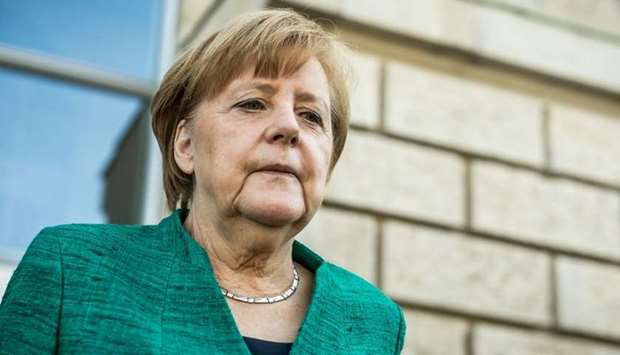* Bavaria CSU immigration hard line could rupture coalition
* Merkel hoping for EU lifeline to settle migration dispute
* Coalition parties still far apart after late-night talks
German officials hope to win support from other European Union states for deals on managing the further travel of refugees already on the bloc's territory - arrangements that could throw a lifeline to embattled Chancellor Angela Merkel.
A government official told reporters bilateral talks on managing so-called secondary migration had been ‘encouraging’ ahead of Thursday's EU government leaders' summit, which may help defuse the crisis over migration dividing her coalition.
The dispute is over plans drawn up by Merkel's interior minister Horst Seehofer, the head of Bavaria's conservative Christian Social Union (CSU), to send back migrants who reach the German border after having registered in other EU states.
Merkel's coalition partners described the situation as very serious after four hours of crisis talks on Tuesday night failed to resolve a dispute that threatens to tear apart her three-month old government.
Sending back migrants is anathema to the usually flexible Merkel as it would undermine her open-door migrant policy and be a major setback to the EU's Schengen open border system. The CSU has given Merkel until the end of this week's EU summit to agree on policies with EU partners to reduce the burden on Germany.
Volker Kauder, a senior lawmaker in Merkel's Christian Democrats (CDU), told German television the argument had not been resolved at Tuesday's talks, which went past midnight at the chancellery, and stressed that the situation was grave.
‘It is very serious - we saw that in the talks, this is not about something small, it is about something central and important. We need to talk to each other,’ said Kauder.
There was no let-up from the CSU, which is piling pressure on Merkel to get a European deal, or at least bilateral deals with countries like Greece and Italy, saying nothing was to be gained by delaying action.
The CSU's bid to curb migrant arrivals appears timed in part to prevent a surge of the far-right, anti-immigrant Alternative for Germany (AfD) party in Bavaria's state election in October. The CSU has dominated the wealthy west German state for decades.
But the CSU is deeply divided, with some senior officials fearing that brinkmanship risks bringing down the government, while others dismiss the direst warnings as a negotiating tactic. ‘It's about scaring the other side,’ said one top official.
The Bavarian conservatives will meet on Sunday to review any EU progress and decide whether to defy Merkel and introduce the new controls. A Civey poll showed 52 percent of conservative voters wanted the CSU to give Merkel more time to reach a deal.
If Seehofer goes ahead with his plans, many members of Merkel's CDU say she would be forced to fire him. That could lead to a breakup of the 70-year-old alliance between the CDU and CSU and rob Merkel of a parliamentary majority.
The main options then look like a Merkel-led minority government or a new election. It is also possible that Merkel, chancellor for nearly 13 years, may lose support in her own CDU.
However, some commentators say the CSU has softened its tone in the last day or two, with some members saying the aim is not to bring down Merkel's government - even if they are not shifting on the main substance of their plans.
Andrea Nahles, head of the Social Democrats (SPD) who also share power with Merkel's conservative-led bloc, said it was unsatisfactory that there was a standstill in the coalition and no one knew how things would end up.
Asked if she was preparing for a new election, she said: ‘I don't know. To be honest with you, we are waiting to see.’
Merkel's open-door migrant policy, which has led to the arrival of more than 1.6 million migrants in Germany since the start of 2015, is blamed for the rise of the AfD, now the country's main opposition party.

